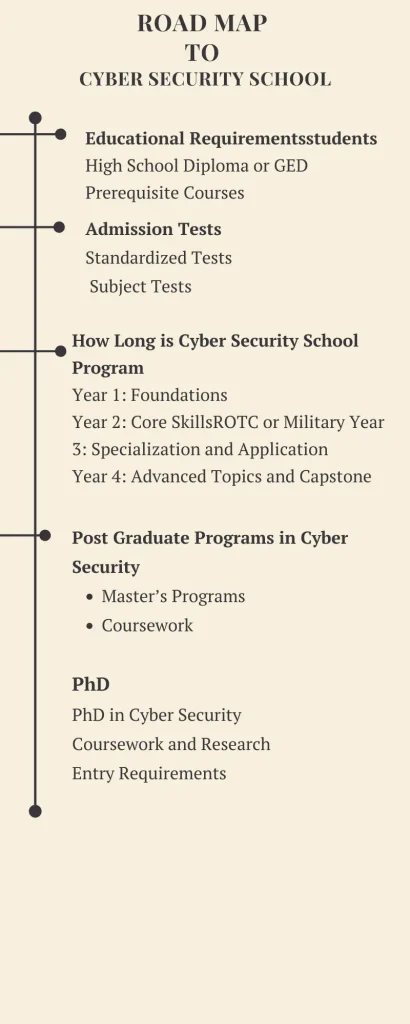How Long is Cyber Security School
The duration of a cyber security program varies, but most degrees take around 2 to 4 years to complete. For those asking, “How long is cyber security school?” certificate programs can be shorter, typically ranging from a few months to a year, depending on the intensity and curriculum.
What is Cyber Security School
Cyber security school equips students with the skills and knowledge needed to protect computer systems and networks from cyber threats. These programs cover a range of topics, including network security, cryptography, ethical hacking, and incident response. Students learn through a combination of theoretical coursework and hands-on training, preparing them for careers in various industries.

Graduates of cyber security programs are in high demand as organizations increasingly prioritize safeguarding their digital assets. Cyber security school also emphasizes real-world applications, often involving simulations and lab work to ensure students are well-prepared for the challenges they will face in the field. These schools offer various credentials, from certificates to advanced degrees, catering to different career goals and levels of expertise.
How Long is Cyber Security School
Year 1: Foundations
Introduction to Cyber Security: Basics of cyber security principles, threats, and protective measures.
Computer Science Fundamentals: Programming languages, data structures, and algorithms.
Networking Basics: Understanding of computer networks, protocols, and communication systems.
Mathematics for Cyber Security: Discrete mathematics and introductory calculus.
General Education Courses: English, humanities, and social sciences.
Year 2: Core Skills
Advanced Networking: In-depth study of network architecture, protocols, and security measures.
Operating Systems: Understanding different operating systems and their vulnerabilities.
Cyber Security Tools and Techniques: Hands-on training with security tools like firewalls, anti-virus, and intrusion detection systems.
Ethical Hacking: Basics of penetration testing and ethical hacking principles.
Electives and General Education: Further general education and elective courses.
Year 3: Specialization and Application
Cryptography: Study of encryption methods and secure communication.
Risk Management and Compliance: Understanding laws, regulations, and risk assessment strategies.
Security Policies and Procedures: Developing and implementing security policies in organizations.
Database Security: Protecting data within database systems.
Electives: Specialized topics like mobile security, cloud security, or forensic analysis.
Year 4: Advanced Topics and Capstone
Advanced Ethical Hacking: In-depth penetration testing and vulnerability assessment.
Incident Response and Management: Techniques for handling and mitigating security breaches.
Capstone Project: Real-world project or research in cyber security.
Internship/Work Experience: Practical experience through internships or cooperative education programs.
Electives: Final specialization courses and advanced topics in cyber security.
Throughout the program, students engage in both theoretical learning and practical applications, preparing them for various roles in the cyber security field.

How to Enter Cyber Security School
Educational Requirements
High School Diploma or Equivalent: Completion of secondary education is mandatory.
Prerequisite Courses: Strong foundation in mathematics, computer science, and sometimes physics.
Minimum GPA: Most programs require a minimum GPA, often around 2.5 to 3.0 on a 4.0 scale.
Entry Tests
Standardized Tests: SAT or ACT scores are often required for undergraduate admissions.
Subject Tests: Some programs might require specific subject tests in mathematics or science.
English Proficiency: For non-native English speakers, TOEFL or IELTS scores may be necessary.
Application Process
Application Form: Complete the online application form on the university or college website.
Transcripts: Submit official high school or previous college transcripts.
Personal Statement: Write an essay outlining your interest in cyber security and career goals.
Letters of Recommendation: Provide 2-3 letters of recommendation from teachers or professionals.
Resume/CV: Some programs might require a resume highlighting relevant skills and experience.
Application Fee: Pay the non-refundable application fee.
Financial Aids
Scholarships: Merit-based and need-based scholarships offered by the institution or external organizations.
Grants: Federal and state grants like the Pell Grant, which do not need to be repaid.
Loans: Federal student loans (subsidized and unsubsidized) and private loans.
Work-Study Programs: Opportunities to work part-time on campus to help cover tuition and living expenses.
Tuition Reimbursement Programs: Some employers offer to pay for their employees’ education in cyber security.
These components are essential for prospective students aiming to enroll in a cyber security program, providing a comprehensive overview of the necessary steps and available resources.
Post Graduate Programs in Cyber Security
Master’s Programs
Master of Science in Cyber Security: Focuses on advanced technical skills, security policies, risk management, and cryptography.
Master of Business Administration (MBA) with Cyber Security Concentration: Combines business management skills with cyber security expertise.
Master of Cyber Security Operations and Leadership: Emphasizes leadership, strategic decision-making, and operations within the cyber security field.
Coursework
Advanced Cryptography: Deep dive into encryption methods and secure communication.
Network Security: Advanced topics in protecting network infrastructure.
Incident Response and Forensics: Techniques for handling and investigating security breaches.
Cyber Security Law and Ethics: Legal and ethical considerations in cyber security.
Capstone Project or Thesis: Practical project or research in a specific area of cyber security.
Entry Requirements
Bachelor’s Degree: In cyber security, computer science, or a related field.
GPA Requirements: Typically a minimum of 3.0 on a 4.0 scale.
Work Experience: Some programs prefer or require relevant professional experience.
Standardized Tests: GRE scores may be required.
Personal Statement: Essay detailing your interest and goals in cyber security.
Letters of Recommendation: Academic and professional references.
PhD Programs in Cyber Security
PhD in Cyber Security
Focus: Research-oriented program aiming to advance knowledge in cyber security.
Specializations: Cryptography, network security, cyber-physical systems, or security policies.
Coursework and Research
Advanced Topics in Cyber Security: In-depth courses on cutting-edge topics.
Research Methods: Training in research methodologies and techniques.
Comprehensive Exams: Assessing knowledge in core areas of cyber security.
Dissertation: Original research contributing to the field, culminating in a dissertation defense.
Entry Requirements
Master’s Degree: In cyber security, computer science, or a related field.
GPA Requirements: Generally a minimum of 3.5 on a 4.0 scale.
Research Experience: Demonstrated ability to conduct independent research.
Standardized Tests: GRE scores may be required.
Personal Statement: Detailed research proposal and career goals.
Letters of Recommendation: Strong academic and professional references.
Interview: Some programs may require an interview with the admissions committee.
Top 10 Cyber Security Schools

1.Carnegie Mellon University (Pittsburgh, PA)
Known for its CyLab Security and Privacy Institute.
Offers a Master of Science in Information Security and PhD programs.
2.Massachusetts Institute of Technology (MIT) (Cambridge, MA)
Renowned for cutting-edge research in cyber security.
Offers a Master of Science in Cybersecurity and a PhD in Electrical Engineering and Computer Science.
3.Stanford University (Stanford, CA)
Home to the Stanford Computer Security Lab.
Offers specialized courses and research opportunities in cyber security.
4.University of California, Berkeley (Berkeley, CA)
Known for its Center for Long-Term Cybersecurity.
Offers a Master of Information and Cybersecurity (MICS) and PhD programs.
5.Georgia Institute of Technology (Atlanta, GA)
Offers a highly regarded Master of Science in Cybersecurity.
Features the Georgia Tech Information Security Center (GTISC).
6.University of Illinois Urbana-Champaign (Champaign, IL)
Known for its Information Trust Institute.
Offers both undergraduate and graduate programs in cyber security.
7.Purdue University (West Lafayette, IN)
Home to the Center for Education and Research in Information Assurance and Security (CERIAS).
Offers undergraduate, master’s, and PhD programs in cyber security.
8.University of Maryland, College Park (College Park, MD)
Features the Maryland Cybersecurity Center (MC2).
Offers a Master of Engineering in Cybersecurity and PhD programs.
9.University of Southern California (Los Angeles, CA)
Offers a Master of Science in Cyber Security Engineering.
Known for its Integrated Media Systems Center focusing on cyber security research.
10.Northeastern University (Boston, MA)
Offers a Master of Science in Cybersecurity.
Features experiential learning opportunities and strong industry connections.
These schools are recognized for their robust cyber security programs, cutting-edge research, and strong industry ties, providing students with comprehensive education and career opportunities in the field.
Factors Affecting the Length of Cyber Security School
Program Type
Certificate Programs: Typically last from a few months to a year, focusing on specific skills and certifications.
Associate Degrees: Generally take about 2 years to complete, covering fundamental cyber security concepts and practices.
Bachelor’s Degrees: Standard duration is 4 years, providing a comprehensive education with general education courses included.
Master’s Degrees: Usually require 1 to 2 years beyond a bachelor’s degree, focusing on advanced topics and specialization.
PhD Programs: Can take 3 to 5 years or more, involving extensive research and dissertation work.
Course Load
Full-Time Study: Students taking a full course load can complete programs in the standard time frame (e.g., 4 years for a bachelor’s degree).
Part-Time Study: Students balancing work or other commitments may take longer, as they enroll in fewer courses per semester.
Prior Education and Experience
Transfer Credits: Students with prior college credits or relevant certifications may reduce the time needed to complete their degree.
Accelerated Programs: Some schools offer accelerated programs for students with substantial prior knowledge or professional experience.
Specializations and Electives
Focus Area: Choosing a specialized track within cyber security (e.g., cryptography, network security) might require additional courses, potentially extending the duration.
Elective Courses: Taking additional electives beyond the core requirements can lengthen the time to graduation.
Internship and Practical Experience
Internships and Co-ops: Participating in internships or cooperative education programs provides valuable hands-on experience but may extend the overall program duration.
Capstone Projects: Some programs require a capstone project or thesis, which can take additional time to complete.
Institutional Policies
Curriculum Structure: Variations in curriculum structure and course availability can impact the length of time to complete a program.
Academic Calendar: Schools operating on different academic calendars (e.g., quarter vs. semester systems) may affect the pacing of course completion.
Personal Factors
Work and Family Obligations: Balancing education with work, family, or other personal responsibilities can impact the time taken to complete a program.
Learning Pace: Individual learning styles and paces can affect how quickly students progress through their coursework.
These factors collectively influence the duration of cyber security programs, making the length of study variable based on individual circumstances and program choices.
Final Verdict
The length of cyber security school varies based on program type, course load, prior experience, specialization, internships, and personal factors, ensuring flexibility to accommodate diverse student needs.
FAQs
1.How long does it take to complete a cyber security certificate program?
Certificate programs typically take a few months to a year, depending on the intensity and curriculum.
2.What is the duration of a bachelor’s degree in cyber security?
A bachelor’s degree usually takes 4 years of full-time study.
3.Can prior education shorten the length of a cyber security program?
Yes, transfer credits and relevant certifications can reduce the time needed to complete the program.
4.Do internships extend the duration of cyber security school?
Yes, internships and cooperative education programs provide practical experience but may extend the overall program duration.
5.What factors can affect the time it takes to complete a master’s degree in cyber security?
Full-time vs. part-time study, prior experience, and thesis requirements can impact the duration, typically 1 to 2 years.
